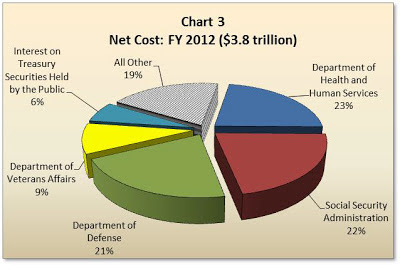In a previous post, we noted that, from an Intellectual Property and legal perspective, American voters are treated as consumers, and politicians can become trademarks.
We were sent a thought-provoking and interesting video by OnlineMBA.com, which creatively argues that government should not be run like a business:
This video advances a few arguments comparing businesses and governments generally.
First, it notes that the core purpose of government is fundamentally different from that of a corporation. For example, it argues that the U.S. federal government is responsible for managing the divergent, competing priorities of over 300 million Americans, and it alone must secure the general welfare by building and maintaining roads and bridges, providing for the common defense, and the like. The video contends that voters are "people," which are more important than "profits."
If a government becomes profitable, it argues, that government is probably hording tax dollars for no good reason. In contrast, a corporation is legally bound to advance one goal: amass profits, and a massive cash reserve can promote its positive fiscal growth.
While it is generally true that government serves a different legal and social purpose than a corporation, this video misses the mark.
First, it ignores the reality that the U.S. federal government has clearly become a major player in the commercial sphere, in its own right. The U.S. Treasury Department reports that current federal expenditures affect huge swaths of the private, domestic economy with trillions of dollars spent each year by the federal government on private defense contracts, the post office, as well as social program spending.
The Treasury Department also notes that federal spending is anticipated to exponentially increase in the decades ahead, mostly to service interest on the debt, to pay for existing expenditures.
Therefore, the video's general proposition that the federal government should not be concerned about amassing profits is not a realistic assessment of the current situation anyway. The government's budget should at least be solvent, if not profitable.
It is worth noting that the U.S. federal government's budget is currently much larger than that of dozens of mega corporations combined, and its decisions have major fiscal as well as political consequences.
Indeed, a recent story on NBC News noted that the federal government is better at creating low-paying jobs than Wal-Mart.
Therefore, the government MUST be run like a mega corporation, if it is going to act like one.
Further, another argument that the video advances is that shareholders and citizens have fundamentally different "rights" within their respective systems. A minority shareholder in a corporation, for example, has no meaningful say in whether to remove a failing CEO, the video argues.
This analogy is weak and imperfect. Within a larger framework of a properly functioning stock market, a shareholder can always choose to "vote with his feet," and sell his share in the corporation to someone else. Therefore, his potential impact is greater in affecting change in that manner in that particular corporation, than his shareholder proxy "vote."
If such an aggrieved minority shareholder, along with thousands of other shareholders, chooses to dump and sell his stock, presumably the failing CEO will be fired or forced to resign. Consequently, the value of a single share in that company will decrease if the CEO is doing a poor job at managing it.
In comparison, an American citizen cannot "sell his vote" in quite the same way, since he has limited options. Because the federal goverment holds a constititional monopoly on power, there is no competition with it. Ironically, the aggrieved American voter is in an actually weaker position than a minority shareholder in a corporation, at least in comparison.
Finally, at least with respect to presidential elections, it is worth noting that a large segment of the American populace is effectively disenfranchised because of the Electoral College. Democratic voters in "red states" and Republican voters in "blue states," have effectively no vote in the Presidential election.
In summary, the debate will continue to rage on as to what extent government should emulate private industry, and vice-versa.



No comments:
Post a Comment